June 17, 2025 | 09:55 GMT +7
June 17, 2025 | 09:55 GMT +7
Hotline: 0913.378.918
June 17, 2025 | 09:55 GMT +7
Hotline: 0913.378.918
Phu Luong is a mountainous district of Thai Nguyen province with diverse soil conditions that are favorable for many specialty crops to grow and develop. This is the second largest tea production area in Thai Nguyen province after Dai Tu district; the area of On Luong vai sticky rice making Bo Dau Chung cake craft village famous throughout the country; a large Gymnema sylvestre medicinal herb area, etc.
Khe Coc hamlet, Tuc Tranh commune (Phu Luong district, Thai Nguyen province), is as beautiful as a steppe, with stretching tea hills and a cool breeze. The bees come together in groups to collect honey from tea pistils. Mr. To Van Khiem, Director of Khe Coc Safe Tea Cooperative, said that bees are very sharp; if the flowers are not clean, they will not come in such large numbers. They are passionate about collecting honey like humans are passionate about the taste of tea in this mountainous area.
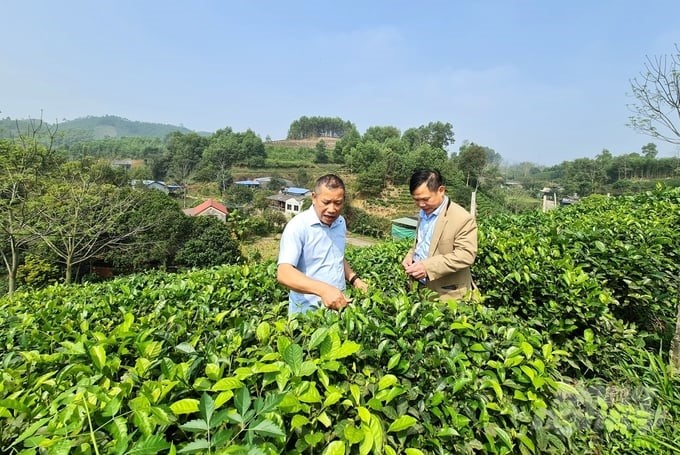
Mr. To Van Khiem, Director of Khe Coc Safe Tea Cooperative (left), at his family's organic tea garden. Photo: Dao Thanh.
Mr. Khiem is one of the first artisans in Thai Nguyen province to be awarded the title of Tea Processing Artisan. His hometown is Phu Xuyen district, Hanoi. At the age of 5, Mr. Khiem followed his parents to the Khe Coc area to build a new economic zone and develop economics from tea. Then there was an economic recession, tea lost its price, and the price was even squeezed by private traders, so tea growers like him had to give up tea to find other jobs to make a living.
Mr. Khiem said that despite wishing to stick with tea, with the burden of raising his two children at school, he had to give up tea. Because if he continued to pursue the tea profession, he would not have enough money to support them through high school and university. After that, he left his hometown for a city to open a restaurant and start a business.
Talking about the fate that made him return to tea, he said that in 2011, in addition to opening a restaurant, he organized travel tours abroad, including a trip to Japan, where he followed a group to the Chiba tea region of Japan. In the tea hills there, grass grew thick and beautiful; tea was said to be grown organically. At that time, he did not understand what organic was; he only knew that it meant cultivating without using fertilizer or chemicals.
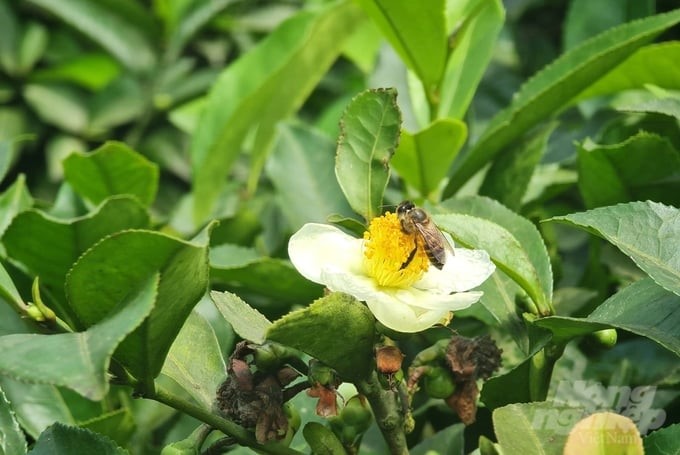
From the day it was planted and cared for according to organic standards, Mr. Khiem's tea garden attracted many bees to collect honey. Photo: Dao Thanh.
The Japanese way of growing organic tea obsessed him and motivated him to return to Khe Coc, the mountainous place nurturing his childhood and having tea terraced fields that were left behind by him. He gathered people with the same new ideology to build a cooperative.
At that time, no one wanted to follow him; they said that his story was unrealistic because people have sprayed pesticides all over tea terraced fields, but the pests have not gone away yet, let alone grow tea without spraying anything. When he said that making clean tea also attracts tourists, people said no tourist wants to go to the middle of nowhere like Khe Coc.
In the first years of growing clean tea, he bought dozens of tons of bananas for his family and cooperative to use as fertilizer, combined with fertilizing decomposed manure composted from cow manure and a microbial decomposition solution. Using organic fertilizers has caused the tea output to decrease significantly, about 40%. This made him and the people in the village quite worried. Although it was difficult, he still decided not to be discouraged. Because if the tea grower keeps carrying the pesticide bottle on his back, it is like wearing a gradual death.
Since 2018, Mr. Khiem's tea terraced fields no longer have any trace of chemicals. His cooperative now has hundreds of hectares of organically produced tea, of which 20 hectares are recognized for organic standards.
He said he was even happier when success gradually dawned; many other farmers accompanied him to head towards the road ahead, arduous but full of hope for a famous organic tea region.
The story of Mr. Khiem buying chicken eggs to fertilize tea continues to surprise tea farmers in Tuc Tranh and the whole Thai Nguyen province. Because chicken eggs are expensive and the tea terraced field is hundreds of hectares wide, it will take a huge amount of eggs.
Mr. Khiem explained: In fact, the chicken eggs he bought were all waste chicken eggs (eggs with young incubation or broken incubation) at a very cheap price (less than VND 1,000/kg), but each kilogram has more than 10 units. The eggs he bought are diluted with water and then watered on tea roots. When it is time to harvest, this tea is classified separately to create special products with more delicious and fragrant tea taste.
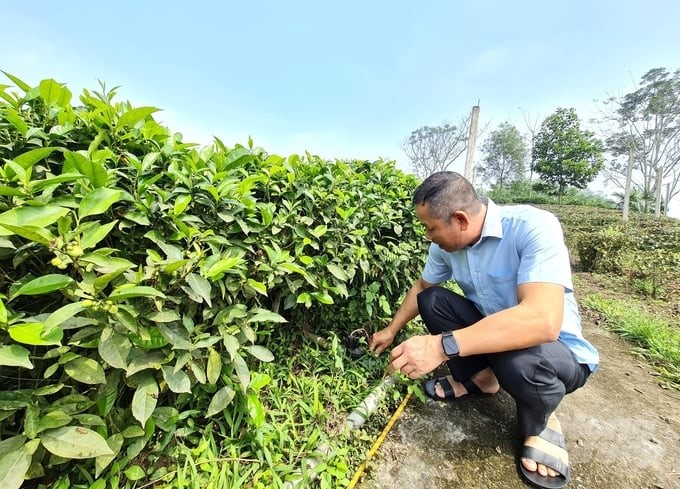
Automatic irrigation system at the tea garden of Mr. Khiem's family. Photo: Dao Thanh.
It is also Mr. Khiem's strange job of "feeding" tea with chicken eggs that created the opportunity for the tea area to reach the ears of the leaders of Thai Nguyen province. And it is also the fate of tea in that hilly countryside to fly all the way to Europe.
He said that in 2019, the leaders of Thai Nguyen province had a business trip to Europe, and the delegation assigned tea cooperatives in the province to make gifts in accordance with European culture.
He found relatives who used to live and work in Europe to understand European drinks, researched, and made tea bags with raw materials from the organic tea area of his hometown. After the challenge and selection, the best pot-brewed teas in Thai Nguyen, such as Tan Cuong and Trai Cai Dong Hy, were refused. Only tea bags from Khe Coc Safe Tea Cooperative stood firm and were accepted.
Also in 2019, the leaders of Thai Nguyen province introduced Khe Coc Safe Tea Cooperative to a contract signed at the Thai Nguyen Provincial People's Committee with the Czech Republic market. "That night, I could not sleep, with many emotions. I felt so excited that just tomorrow, the flavor of my hometown’s tea will fly all the way to Europe, serving the guests who are demanding but know how to love and enjoy tea,” said Mr. Khiem.
The organic tea area of Khe Coc Safe Tea Cooperative has an area of up to 100 hectares, of which 20 hectares have been certified organic; the rest are being converted. Mr. Khiem said 100 hectares sounds large, but it is nothing to big customers. Recently, a partner in Europe wanted to sign a contract for 100 tons, but the cooperative did not dare to accept.
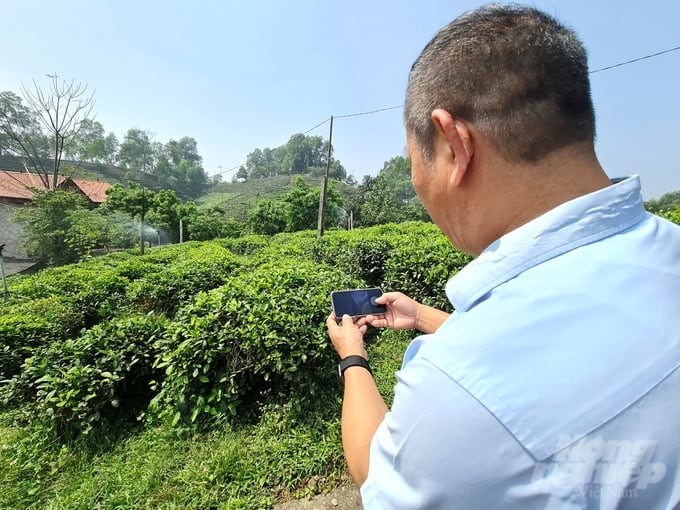
Mr. Khiem checks the automatic irrigation system via smartphone. Photo: Dao Thanh.
Explaining the reason, Mr. Khiem said that when working with Europe, despite good prices, their requirements are also very strict, so production must be very careful.
Like last year, to guarantee 13 tons of tea exported to partners in Europe, partners required the cooperative to make a deposit of more than VND 100 million/ton to create a bond between the two parties. If it does not meet standards, the tea shipment will be destroyed, and the cooperative will lose more than VND 10 billion in tea money and about VND 1.5 billion in deposit money. Thus, if the cooperative does not ensure that the tea meets safety standards, the risk will be huge.
From then on, he realized that farmers are often satisfied when they have enough food and expenses. But when meeting a customer with big demands, it is necessary to do big business, change thinking, and look to the future. Therefore, expanding and developing good agriculture is very essential.
The afternoon sun penetrates tea terraced fields, bringing with it the strong, faint scent of tea. The essence of the soil and the tree is poured into young tea buds, and then, through the skillful hands of the artisan, it is roasted to create the rich flavor of Khe Coc mountains and hills—a unique taste of tea for people to remember forever when clicking their lips. That taste of tea is also the smell of the soil, of the source of life, and of years far away, when the soil was still as healthy as the wild nature of creation.
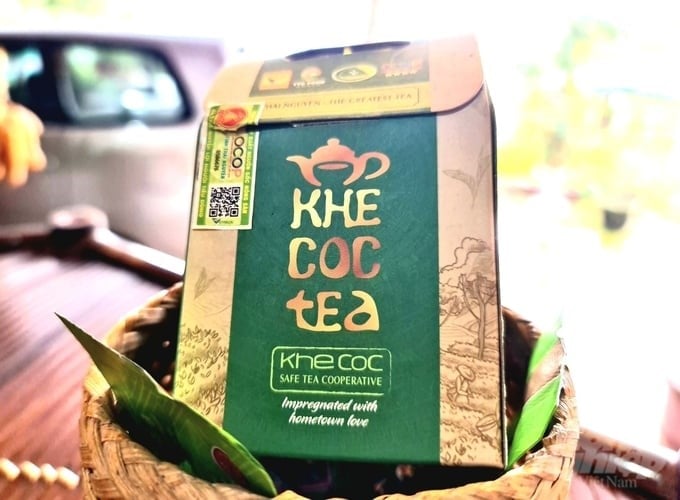
The tea products of Khe Coc Safe Tea Cooperative have achieved OCOP stars. Photo: Dao Thanh.
Mr. Hoang Ngoc Danh, Vice Chairman of Tuc Tranh Commune People's Committee, said that Khe Coc Safe Tea Cooperative is a typical effective tea cooperative of the commune.
Currently, the cooperative has five OCOP products, including three 4-star products and two 3-star products. Khe Coc Safe Tea Cooperative is producing and bringing to market about 12–13 different products with selling prices ranging from VND 500,000 to VND 1.2 million/kg. The cooperative brings an average income of more than VND 300 million/year to affiliated households; the lowest household also reaches VND 120 million/year.
Translated by Huyen Vu Thu
/2025/06/12/3721-2-202745_83.jpg)
(VAN) TH made an impression at Seoul Food 2025 with its line of natural beverages, paving the way for Vietnamese food products to enter the South Korean market.

(VAN) Soc Trang's success in rice exports stems from a strategy of developing fragrant and specialty rice cultivation areas and standardizing production toward low-emission practices.
/2025/06/11/1311-5-120811_839.jpg)
(VAN) The pig farming industry is facing the challenge of comprehensive restructuring to meet requirements for quality, safety, traceability, and market expansion both domestically and for export.

(VAN) Vietnam considers participating in ALGROALBA in order to expand agricultural production, coordinate the assessment and effective exploitation potential land.
/2025/06/05/5314-1-184727_407.jpg)
(VAN) From seemingly worthless fish scales and skin, enzymes and lactic ferments can transform by-products into peptides, opening a sustainable, effective business direction and elevating Vietnamese seafood.

(VAN) TTC AgriS and IFC signed a strategic partnership to develop a sustainable agricultural value chain, aiming to achieve the Net Zero target by 2035.

(VAN) Seafood by-products are opening a new path, combining green growth and technological innovation to enhance the industry's value.